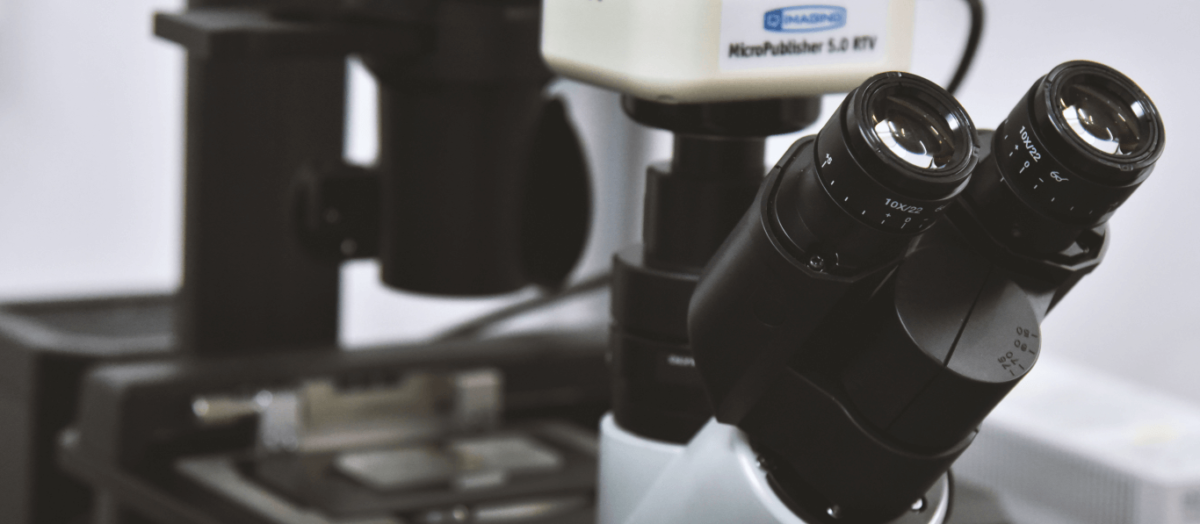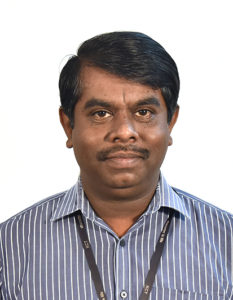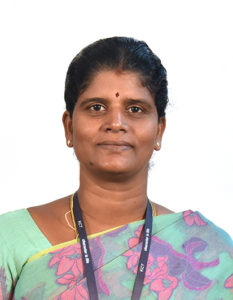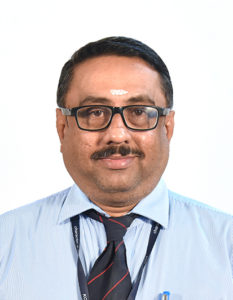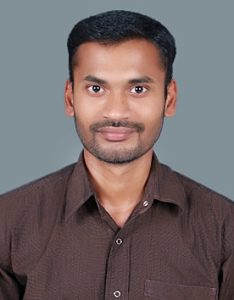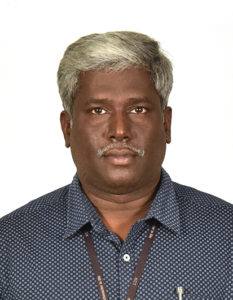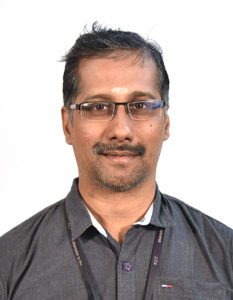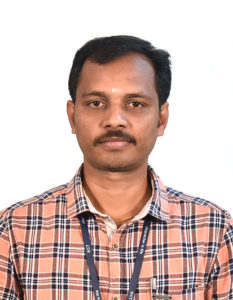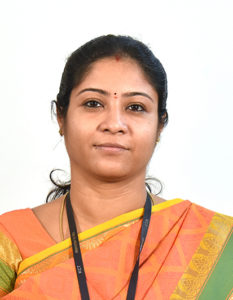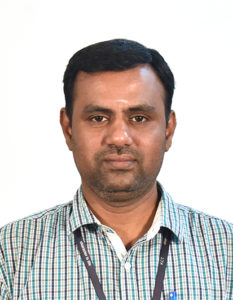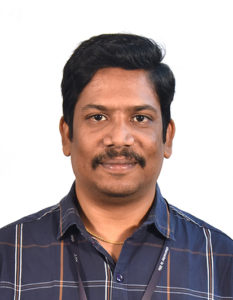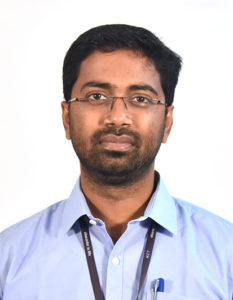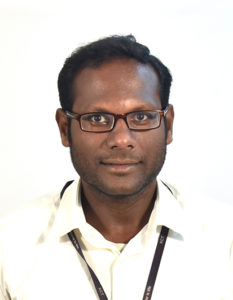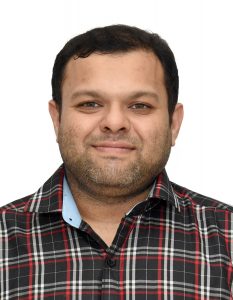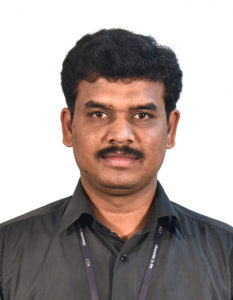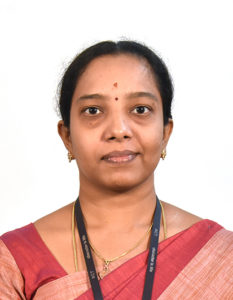About the Department
The Department of Biotechnology is a pioneering department, which harnesses and nurtures specific skill sets that integrates life science and technology, and the curriculum is constantly upgraded to suit the demands of the industry. Faculty members are trained both in reputed institutes and industries periodically in a constantly evolving field of engineering relevant to biotechnology. Currently, the Department of Biotechnology offers B.Tech.(Biotechnology), M.Tech.(Biotechnology) and Ph.D.(Full/Part-time) with a well-structured and balanced curriculum focusing on the major areas viz., Healthcare, Nutrition, Bioprocess Technology and Environmental Biotechnology.
From the HOD’s Desk
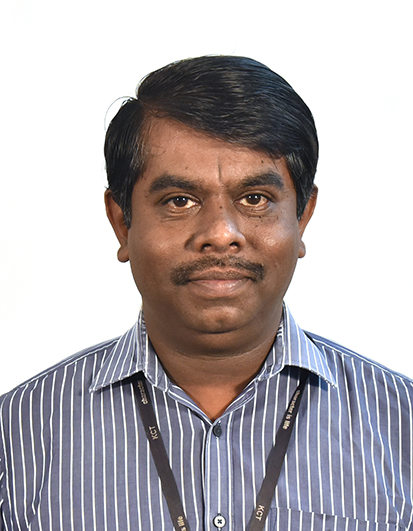
Dr. Vinohar Stephen Rapheal,
Associate Professor & Head
The Department of Biotechnology commenced its academic and scientific journey in the year 2002, and built up ambience and infrastructural facilities for effective academic and research activities over the period. Our students have excelled in curricular, co-curricular and extra-curricular activities. The faculty members engage in effective curriculum delivery and research on socially relevant projects. Most of our graduates get placed in life science related companies and the rest pursue higher studies in reputed institutes in India and abroad. Our graduates, spread all over the world, are the dynamic ambassadors of our performance.
Vision
Strong teaching and research foundation in the area of biotechnology and allied fields through knowledge dissemination to students and the public and to scale new heights in the frontier areas of health and environment and ethics for welfare of humankind globally.
Mission
- Develop dynamic curriculum and syllabus to promote innovative and create practices.
- Encourage students for innovation and setting start-ups and equip leadership an entrepreneurial skills
- Train students on issues related to social welfare.
Industry
The Department offers one-credit industry course in association with several industries in India. The courses are designed in such a way to add value addition and exposure to the students in the department thrust areas. Apart from value-addition, the course provides hands-on experience and awareness to the student which is critical at this present scenario for the booming biotechnology job market.
List of courses offered for both UG and PG Students
- Pharmacovigilance with Oviya Med Safe, Coimbatore & UK
- Mushroom Production with TNAU, Coimbatore
- Natural Products with Phytospecialities, Chennai
- Protein Purification using FPLC with GE, Bangalore
- Engineering Materials in Medicine, with NUS, Singapore.
The department of Biotechnology at KCT is a leading provider of biotechnology education in Tamil Nadu.
The department offers:
B.Tech (Biotechnology) – 4 years (NBA Accredited in 2022)
(Curriculum: 2018, 2017, 2015)
The B.Tech programmes prepares students to engineering work related to bio manufacturing, R&D in pharmaceutical industry, Food product development, Environmental pollution management, natural product development, bio-informatics solutions etc. The problems faced by the biotechnology industry offer an unusual opportunity – the industry faces a dearth of skilled workforce. Much of the analysis and development must be accomplished at the very frontiers of knowledge, conforming to various international and national guidelines. The B.Tech programme is designed as to bridge that gap. The syllabi and curriculum is developed to be contemporary and match the current requirements of the biotechnology sector.
The B.Tech programme has the following Graduate outcomes:
- Engineering knowledge: Apply the knowledge of mathematics, science, engineering fundamentals, and an engineering specialization to the solution of complex engineering problems.
- Problem analysis: Identify, formulate, review research literature, and analyse complex engineering problems reaching substantiated conclusions using first principles of mathematics, natural sciences, and engineering sciences.
- Design/development of solutions: Design solutions for complex engineering problems and design system components or processes that meet the specified needs with appropriate consideration for the public health and safety, and the cultural, societal, and environmental considerations.
- Conduct investigations of complex problems: Use research-based knowledge and research methods including design of experiments, analysis and interpretation of data, and synthesis of the information to provide valid conclusions.
- Modern tool usage: Create, select, and apply appropriate techniques, resources, and modern engineering and IT tools including prediction and modelling to complex engineering activities with an understanding of the limitations.
- The engineer and society: Apply reasoning informed by the contextual knowledge to assess societal, health, safety, legal and cultural issues and the consequent responsibilities relevant to the professional engineering practice.
- Environment and sustainability: Understand the impact of the professional engineering solutions in societal and environmental contexts, and demonstrate the knowledge of, and need for sustainable development
- Ethics: Apply ethical principles and commit to professional ethics and responsibilities and norms of the engineering practice.
- Individual and team work: Function effectively as an individual, and as a member or leader in diverse teams, and in multidisciplinary settings.
- Communication: Communicate effectively on complex engineering activities with the engineering community and with society at large, such as, being able to comprehend and write effective reports and design documentation, make effective presentations, and give and receive clear instructions
- Project management and finance: Demonstrate knowledge and understanding of the engineering and management principles and apply these to one’s own work, as a member and leader in a team, to manage projects and in multidisciplinary environments.
- Life-long learning: Recognize the need for, and have the preparation and ability to engage in independent and life-long learning in the broadest context of technological change
- PSO1 : An ability to apply the knowledge of food/ medical / environmental and computational biology to perform image analysis and processing, data mining and Big data analytics.
- PSO2 :An ability to understand and design solutions using bioprocess principles, bioanalytical instrumentation and techniques and cell culture techniques.
M.Tech (Biotechnology) – 2 years (NBA applied) (Curriculum: 2018, 2015)
The following are the Program Educational Objectives of M.Tech. (Biotechnology) program:
- PEO1 – To apply professional knowledge and skills in academia, industry, entrepreneurship and research.
- PEO-2 – To enable students to evaluate real life problems and to propose biotechnological solutions with economical and social impact.
- PEO-3 – To train students to work in a team for intellectual independence to provide innovative solutions.
PROGRAM OUTCOMES (POs)
- PO1: An ability to independently carry out research / investigation and development work to solve practical problems.
- PO2: An ability to write and present a substantial technical report / document.
- PO3: An ability to demonstrate a degree of mastery over the area as per the specialization of the program.
- PO4: An ability to employ bio-based techniques to address issues related to health with professional ethics.
- PO5: An ability to develop/ utilize sustainable technology to address environmental issues.
- PO6: An ability to apply modern engineering tools for the implementation of interdisciplinary projects.
PhD programme -Full time and Part-time
List of Ph.D Scholars in the Department
| Sl. No. | Reg. No. | Name of the Scholar | Date of registration | Full time / Part time | Name of the Guide | Awarded/Ongoing |
|---|---|---|---|---|---|---|
| 1. | 71031121011 | R. Balakrishnaraja | – | Part time | Dr. P. Ramalingam | Awarded |
| 2. | 71031121001 | L. Vijayakumar | – | Part time | Dr. P. Ramalingam | Awarded |
| 3. | 11111132001 | S. Nithya Priya | – | Part time | Dr. P. Ramalingam | Awarded |
| 4. | 7071012248 | N. Kalyani | – | Part time | Dr. N. Saraswathy | Awarded |
| 5. | 100911122001 | J. Kiruthika | – | Part time | Dr. N. Saraswathy | Awarded |
| 6. | 11210132037 | P. Kanmani | – | Part time | Dr. K. Kumaresan | Awarded |
| 7. | 71010721002 | D. R. Manimaran | – | Part time | Dr. P. Ramalingam | Ongoing |
| 8. | 11211131006 | P. Muthukumaran | 2014-15 | Part time | Dr. N. Saraswathy | Ongoing |
| 9. | 1524569737 | G. Poorani | 2018-19 | Part time | Dr. R. Baskar | Ongoing |
| 10. | 1417769156 | R. Sudhakaran | 2016-17 | Part time | Dr. N. Saraswathy | Ongoing |
| 11. | 11200131034 | M. Jayakumar | 2016-17 | Part time | Dr. N. Saraswathy | Ongoing |
| 12. | 17245697134 | V. Veerabhuvaneshwari | 2017-18 | Part time | Dr. N. Saraswathy | Ongoing |
| 13. | 17145697133 | S. Balaji | 2017-18 | Full time | Dr. N. Saraswathy | Ongoing |
| 14. | 18122691109 | T. Suresh | 2017-18 | Part time | Dr. N. Sivarajasekar | Ongoing |
| 15. | 18135691114 | K. Balasubramani | 2017-18 | Part-time | Dr. N. Sivarajasekar | Ongoing |
| 16. | 18155691130 | Dymphan F Gonsaldes | 2017-18 | Full time | Dr. N. Saraswathy | Ongoing |
| 17. | 1513769721 | A. Rakiyanasamy | – | Full time | Dr. M. Shanmugaprakash | Ongoing |
| 18. | 19135691118 | K. Murugesan | 2018-19 | Part time | Dr. N. Sivarajasekar | Ongoing |
| 19. | 20155691137 | Shail Adrian Jagmag | 2019-20 | Full Time | Dr. R. Baskar | Ongoing |
| 19. | 21237691150 | Gayathri. T | 2020-21 | Part time | Dr. N. Saraswathy | Ongoing |
| 20. | 21245691125 | Kamali M | 2020-21 | Part time | Dr. N. Saraswathy | Ongoing |
| 21. | 20125691127 | Rajkumar A | – | Part time | Dr. N Sivarajasekar | Ongoing |
| 22. | 21245691102 | Sukanya K | – | Full Time | Dr. N Sivarajasekar | Ongoing |
List of Ph. D Scholars who have completed
| Sl. No. | Reg. No. | Name of the Scholar | Title of the Thesis | Month and year of completion | Name of the Guide |
|---|---|---|---|---|---|
| 1 | 71010721002 | D.R.Manimaran | Removal and decolourization of synthetic dyes in textile effluent by liquid-liquid extraction and biological methods | 04-12-2019 | Dr. P. Ramalingam |
| 2 | 11111132001 | S. Nithya Priya | Development and evaluation of probiotic juices fortified with nutraceuticals | 27-08-2018 | |
| 3 | 71031121001 | L. Vijayakumar | Certain investigations on the production and optimization of β-glucan by Bacillus cereus LVK13 | 11-04-2017 | |
| 4 | 71031121011 | R. Balakrishnaraja | Investigation of indigenous yeast isolates for the fermentative production of xylitol | 29-07-2016 | |
| 5 | 7071012248 | N. Kalyani | Studies on lipase from Staphylococcus aureus NK-LB37 and Cladosporium cladosporioides NK LF36 and their application in transesterification of karanja (Pongamia pinnata) oil | 17-02-2016 | Dr. N. Saraswathy |
| 6 | 100911122001 | J. Kiruthika | Optimization of L-glutaminase production from marine Bacillus subtilis JK-79 and its characteristics | 20-12-2016 | |
| 7 | 11210132037 | P. Kanmani | Gene expression, purification, characterization and environmental applications of bacterial lipases | 26-07-2016 | Dr. K. Kumaresan |
Department Statistics
| Year of establishment | 2002 |
|---|---|
| Faculty strength | 15 |
| Technical Support Staff | 5 |
| Students Strength (UG & PG) | 200 |
| PhD-Research scholars – Both Full/ Part-time | 13 |
Established in the year 2002 with an UG program in Biotechnology.
- Offers PG program in BT from the year 2007.
- Recognized as Research center for Ph.D program from the year 2009
- UG NBA program accredited by NBA during 2009, 2014
- PG NBA program accredited in the year 2019
- Research Funding over ~ 2.01 C
Name of the Lab: Biochemistry and Microbiology Laboratory
- Location & space : ADM:102 & 103/ 164.5 Sq.m
- Faculty in-charge: Dr. K. Kumaresan
About the laboratory facilities and Academic Utilisation
The main focus of the lab is to train students with basic microbiology techniques for microorganism isolation of pure cultures, growth kinetics, antimicrobial susceptibility assays, characterization, Mass cultivation and analysis. As a part of biochemistry, the students are exposed to various fundamental biological calculations, buffer preparation, quantification of bioanalytes, chromatography techniques and so on. The taught techniques can be exercised to solve various biological issues.
Research Activity
The research focus of the laboratory is to study the antimicrobial action, pre-and probiotic impact, cholesterol regulating effects, antiglycation property, urolithic activity, drug release kinetics and value added biomaterial (surface engineering) effects of metabolites from natural sources (Plants & Microbes) by executing classic and contemporary methods such as TLC, 2D-TLC, PTLC and Liquid Column Chromatography. We also study several industrially important microorganisms, their beneficial biosynthesis (enzymes, peptides, metabolites) through different screening and investigation methodologies. On par, the laboratory is also involved in nanomaterial (metallic and protein based) preparation and applications in food and environmental aspects. The laboratory has acquired external government grants from DBT, DST, ICMR, CSIR, AICTE etc,.More than 50 research publications (SCOPUS, SCI indexed journals etc.) has been made by utilizing the laboratory resources.
Our researchers group are also actively involved in imparting training in Microbiology, Natural products research based techniques and Nanotechnology applications in Food and Environment for upcoming researchers.
This lab is authorised for antimicrobial sensitivity analysis
Name of the Lab: Cell Biology and Immunology Laboratory
- Location & space : ADM:104 / 157 Sq.m
- Faculty in-charge: Mr. P. Muthukumaran
About the laboratory facilities and Academic Utilisation
This lab. mostly utilized to teach fundamentals in the area of basic immunology and serological studies for B.Tech Biotechnology programme. In this lab, basic experiments like, staining of blood cells, cell counting, Blood grouping, Determination of antigen and antibody concentration and qualitative and quantitative analysis of blood components. As a part of Biotechniques laboratory, this lab equipments were used to teach techniques exposed to various basic instruments and equipments to understand working principles. Apart from, this lab. Utilized to determine the concentration of various biomolecules in the biological samples.
Research Activity
Main research focus of this lab are extraction, optimization of phytochemicals from medicinal plants. Plants studied so far: Amorphophallus paeonifolius, Aloe vera, Borassus flabellifer, Peltophorum pterocarpum, Solanum trilobatum.
Name of the Lab: Plant Tissue culture Laboratory
- Location & space : ADM:104 / 40 Sq.m
- Faculty in-charge: Mr. P. Muthukumaran
About the laboratory facilities and Academic Utilisation
This special lab. established in the year of 2016 to teach basic of plant cell culture techniques. Basic techniques including, Media and stock solution preparation, Explant selection and preparation, Induction of callus, suspension culture etc.,.
Research Activity
This lab. primarily focused to culturing of plant cells for production of bioactive principles (Phenol). Initially in this lab.,establish Induction of Multiple shoot from Bamboo and currently focused research on induction of callus and extraction of phytochemicals from callus culture of Gymnema, Abutilon indicum.
Name of the Lab: DownStream Processing Laboratory
- Location & space : ADM:106/ 98.81 Sq.m
- Faculty in-charge: Dr. M. Shanmugaprakash
About the laboratory facilities and Academic Utilisation
The main focus of the lab is to train students in various purification techniques for such as cell disruption using Ultrasonication and Homogenization, cell concentration using Microfiltration, production concentration using Ultrafiltration, Aqueous Two phase extraction and also including various chromatography techniques. The students are exposed in column packing, buffer preparation, how to choose right columns materials and purify the biomolecules from various both plant and animal source. The taught techniques can be exercised to design and scale-up various in protein purification and downstream processes.
Research Activity
The research focus of the lab includes separate and purify the biomolecules from various sources. Also we are standardizing the enzyme assay such as protease, Bromelain Pectinase , xylnase alpha –amylase, alpha-galactosidase etc. Major research activity is pre-treatment of agrowaste for production of high value products , production oh biogas from food waste, pretreatment of natural fibres using enzymatic methods . Consultancy services related to enzyme production, purification and its application in textile industry, leather industry and food industry are also offered on payment basis.
Name of the Lab: Chemical Engineering & Organic Chemistry Laboratory
- Location & space : ADM:107/ 151.15 Sq.m
- Faculty in-charge: Dr. N. Sivarajasekar
About the laboratory facilities and Academic Utilisation:
The main focus of the lab is to train students with industrial equipments for related to upstream and downstream processing. The students are exposed to various fundamental stoichiometry calculations, unit operations, heat and mass transport mechanisms, and rheological behaviours. The taught techniques can be exercised to design and scale-up various biological processes.
Research Activity
Laboratory for Bioremediation Research is part of this lab. Main research focus of this lab are solving environmental problems and developing food products. The Environmental research group is actively working on phytoremediation, biosorption, green emulsion membranes, and biosurfactants. The Food product group is involving in the millet based bread production, health mix preparation and probiotic juices.
Name of the Lab: Molecular Biology and Genetic Engineering Laboratory
- Location & space : ADM:108/ 102.7 Sq.m
- Lab incharge – Dr. K Kumaravel
About the laboratory facilities and Academic Utilisation
The main focus of the lab is to train the students in basic molecular biology techniques like DNA & RNA isolation from various sources and quantification, electrophoresis, competent cell preparation, electroporation, restriction-digestion and ligation, cloning into gene expression vectors and induction, western blotting and PCR. The lab is equipped with Real Time PCR (Thermofisher), Nanodrop and FluorChem Gel Documentation (Alpha Innotech) to conduct gene expression analysis. Real Time PCR and FTIR are available for Consultancy services on payment basis.
Research Activity
The research focus of the lab are monitoring of antibiotic resistant bacteria and antibiotic resistant genes and mobile genetic elements present in the environment by using metagenomics approach. It focuses on unculturable bacterial community and their resistant determinants and also determining the level of resistance in the bacteria. Our prime area of interest for antibiotic resistance is wastewater treatment plants and animal farms. The second area work is on gene expression analysis of matrix metallo proteases in diabetic foot ulcer.
Name of the Lab: Bioprocess Laboratory
- Location & space : ADM:109/ 136.94 Sq.m
- Faculty Incharge – Dr. P Ramalingam
About the laboratory facilities and Academic Utilisation
The primary focus of the lab are extraction of enzymes, partial purification of enzymes and characterization of enzymes such as optimum temperature, pH, and inhibitors. This lab also well-equipped with walk-in cold room, Kjedhal apparatus (for total nitrogen estimation), fermenters (5 L and 50 L), ion-exchange chromatography, hydrophobic interaction chromatography and ultra-filtration unit
Research Activity :
The research focus of the lab are removal of synthetic dyes in textile dyeing effluents by solvent extraction process. Centrifugal extractor, an automation for solvent extraction is used to avoid the time delay for extraction of dyes from textile dyeing effluents. Natural polymers such as cellulose and chitosan have modified chemically as adsorbents for the selective removal of dyes textile waste water. The research focus also concentrated on purification of enzymes from microbial and plant sources. Alpha-galactosidase from mushroom have been purified to homogeneity. Biodiesel from various vegetable oils have been prepared. The composition of natural fibers have also been done
Name of the Lab: Bioinformatics Laboratory
- Location & space : ADM:309/ 68.45 Sq.m
- Faculty in-charge: Dr. K. Ram
About the laboratory facilities and Academic Utilisation
The primary focus of the lab are Biological data analysis , protein modelling and simulation, large-scale sequence analysis and machine learning methods for biological problems. The lab is well equipped with a Dell Server T20 and several other client machines.
Research Activity: The research focus of the lab includes mainly on Protein-ligand and Protein-protein interaction using molecular Dynamics studies. The research focus also extends to metagenomics and biological database construction. The lab integrates mainly with other laboratories for data collection and analysis. The lab is equipped with many proprietary software like Intelligen Super Pro Designer, Design Expert 10.0 and many other open source software – Gromacs, Galaxy, Rosetta.
Name of the Lab: M.Tech Laboratory
- Location & space : ADM:310/ 171.17 Sq.m
- Faculty In-Charge : Dr. S. Nithyapriya
About the laboratory facilities and Academic Utilisation
The main focus of the laboratory is on Medicinal Plants Research. The lab is exclusively utilized for conducting lab classes like Concepts in Biochemistry (odd semester) and Mammalian Cell Culture Lab (even semester- preparation of reagents and sterilization aspects). The lab is also utilized to train the students in handling equipment pertaining extraction of phytocompounds from medicinal plants using Soxhlet Extraction and carrying out antioxidant and phytochemical assays. The lab houses sophisticated equipment like Refrigerated High Speed Centrifuge (DBT funded; 17 lakhs), Microplate Reader Fluorescence / Chemiluminscence (DBT funded; 7 lakhs). UV-Visible Spectrophotometer, COD digestor, Double distillation Unit
Research Activity
The major activity of this lab is conducting experiments related to antioxidant, anti-inflammatory and phytochemical assays.Utilizing the major focus of the lab, two MoU with industries like M/S PharmaGenica HealthCare Private Limited, Bengaluru and M/S Phyto Specialities Private Limited, Chennai were signed during the year 2016 and 2017 respectively. Collaborative publications and projects with these industries were carried out during the past two years. Two TNSCST students projects scheme (one is industry linked – Phyto Specialities Private Limited) and two Re” students projects funded by KCT Management were sanctioned to carry out in this lab during last two years. Consultancy services related to antioxidant and phytochemical assays are also offered. Efforts are planned to isolate the active principle from untapped plant sources for pharmacological actions.
Name of the Lab: Mammalian Cell Culture Laboratory
- Location & space : ADM:310B / 36 Sq.m
- Faculty In-Charge: Dr. R. Baskar
About the laboratory facilities and Academic Utilisation
The main focus of the lab is to train students in learning mammalian cell culture techniques like preparation of culture medium, establishment of primary culture, handling of cell lines, subculture and maintenance of cell lines in strict sterile conditions. The facility includes preparation room, two inoculation rooms separate for primary culture and cell lines and a common incubation room. The sophisticated equipment includes inverted phase contrast/ fluorescence microscope and CO2 incubator worth 20 lakhs.
Research activity
The research focus of the lab includes screening of medicinal plants/ phytocompounds for anticancer activity. Cell lines like breast cancer, colon cancer, bone cancer, liver cancer and skin cancer are maintained in this lab. Major research projects related to anticancer activity and gene expression studies has been planned in future. The lab is also open to consultancy services to KCT and outside institutions/ industries on payment basis.
| No. of Textbooks | 239 |
| No. of Journals | 12 – Paperback
602 – Online Subscription |
| S. No | Room No. | Name of the Lab, Class | Area (in sq. m) |
|---|---|---|---|
| 1 | AD101 A | HOD Room | 23.78 |
| 2 | AD101 B | Conference Room | 25.55 |
| 3 | AD101 C | Dept. Office / Faculty Room | 31.33 |
| 4 | AD102 & AD103 | Micro biology Lab & Bio-Chemistry Lab | 164.5 |
| 5 | AD104 | Cell Biology & Immunology Lab | 157 |
| 6 | AD105 | II year B.Tech BT Class Room | 99.59 |
| 7 | AD106 | Down Stream processing Lab | 98.81 |
| 8 | AD107 | Chemical Engg. & Bio-organic Chemistry Lab | 151.15 |
| 9 | AD108 | Molecular Biology & Genetics Engg. Lab | 102.7 |
| 10 | AD109 | Bio-process lab | 136.94 |
| 11 | AD301A | Faculty Cubical | 14.3 |
| 12 | AD301B | Tutorial Room UG | 33 |
| 13 | AD306 | III year B.Tech BT Class Room | 99.59 |
| 14 | AD307 | IV year B.Tech BT Class Room | 89.45 |
| 15 | AD308A | Counseling Room/Dept Library | 11 |
| 16 | AD308B | I year M.Tech BT Class Room | 33 |
| 17 | AD309 | Bioinformatics Lab | 68.45 |
| 18 | AD310 | Mammalian Cell Culture Lab and M. Tech / Research Lab | 171.17 |
| 19 | AD325 | II year M.Tech BT Class Room | 73.57 |
- Natural Products
- Healthcare and Nutrition
- Bioprocess Technology
- Environmental Biotechnology
- Bioinformatics
Research Centre Affiliation details:
The first approval for Biotechnology Research Centre Affiliation was accorded in April 2009 from Anna University, Chennai. Then successive renewals were carried out during every year and the current validity is sanctioned up to December 2021.
| S No | Name of the Supervisor | Designation | Name of University | Supervisor Recognition number |
|---|---|---|---|---|
| 1 | Dr. N. Saraswathy | Professor | Anna University, Chennai. | 1211011 (2370546 – New) |
| 2 | Dr. P. Ramalingam | Professor | Anna University, Chennai. | 1011005 (3150002 – New) |
| 3 | Dr. R. Baskar | Associate Professor and Head | Anna University, Chennai. | 2270071 |
| 4 | Dr. Vinohar Stephen Rapheal | Associate Professor | Anna University, Chennai. | 1101373 |
| 5 | Dr.K.Kumaresan | Associate Professor | Anna University, Chennai. | 1101371 (2370280 – New)) |
| 6 | Dr. M.Shanmugaprakash | Associate Professor | Anna University, Chennai. | 2650002 |
| 7 | Dr. N. Sivarajasekar | Assistant Professor-II | Anna University, Chennai. | 2550008 |
| 8 | Dr.K.Ram | Assistant Professor-II | Anna University, Chennai. | 2950007 |
| 9 | Dr.A.Thirumurugan | Assistant Professor-I | Anna University, Chennai. | 2850009 |
Publications
| Number of Faculty with Ph.D | 13 |
| Total citations of the Department (SCI indexed) | 5180 |
| H-index of the Department | 37 |
| i10 Index of the Department | 137 |
| Number of Funded projects | |
| Total Amount of funding (Rs.,) | ~2.01 Cr |
List of Publication after Aug 2019
- Shree, V. S., Sathishkumar, T., Kumaresan, K., Rapheal, V. S., Muthukumaran, P., & Muthukumaran, V. (2021). Therapeutic effects of purified polyphenols from Coccinia grandis: correlation between hypertension and diabetes mellitus. Advances in Traditional Medicine, 1-12.
- Gowthama Prabu, U., Baskar, R., Kumaresan, K., & Poorani, G. (2020). Investigations into the phytochemical profile in the seeds of Elaeocarpus variabilis fruits: A potential untapped source endemic to Western Ghats. Journal of Pharmacognosy and Phytochemistry, 9(4), 566-571.
- Govindarajan, D. K., Viswalingam, N., Meganathan, Y., & Kandaswamy, K. (2020). Adherence patterns of Escherichia coli in the intestine and its role in pathogenesis. Medicine in Microecology, 100025.
- Saravanan, Y., Devaraj, B. S., Velusamy, N. K., Soundirarajan, P. S., & Kandaswamy, K. (2020). Phytochemical Extracts of Leucas aspera and Dahlia pinnata Exhibit Antimicrobial Properties in Escherichia coli and Enterococcus faecalis. Current Biotechnology, 9(4), 297-303.
- Dinakari Sarangan, Keerthana Sakthivadivelan, Darsini Thiyagarajan, Apsara Sudhakar, Krithika Balakrishnan, Ram Kothandan, and Kumaravel Kandaswamy. In Silico Screening of Antimicrobial Compounds Using Docked Complexes of Antibiotics and Antimicrobial Peptides. Biosc.Biotech.res.Comm. Special Issue Vol 13 No 11 (2020) Pp-47-5.
- Gowthama Prabu, U., Anushri, I., Kishor Kumar, B., Saravanan, M., & Baskar, R. (2020). Study on the in vitro antioxidant properties of selected traditional medicinal plants. Journal of Pharmacognosy and Phytochemistry, 9(4), 1831-1837.
- Faisal, A. A., Ahmed, D. N., Rezakazemi, M., Sivarajasekar, N., & Sharma, G. (2021). Cost-effective composite prepared from sewage sludge waste and cement kiln dust as permeable reactive barrier to remediate simulated groundwater polluted with tetracycline. Journal of Environmental Chemical Engineering, 9(3), 105194.
- Udayakumar, G. P., Muthusamy, S., Selvaganesh, B., Sivarajasekar, N., Rambabu, K., Banat, F., … & Show, P. L. (2021). Biopolymers and composites: Properties, characterization and their applications in food, medical and pharmaceutical industries. Journal of Environmental Chemical Engineering, 9(4), 105322.
- Kothandan, R., Rajan, C. A. S. G., Arjun, J., Raj, R. R. M., & Syed, S. (2021). Virtual screening of phytochemical compounds as potential inhibitors against SARS-CoV-2 infection. Beni-Suef University journal of basic and applied sciences, 10(1), 1-7.
- Sivaramakrishnan, M., Kandaswamy, K., Natesan, S., Devarajan, R. D., Ramakrishnan, S. G., & Kothandan, R. (2020). Molecular docking and dynamics studies on plasmepsin v of malarial parasite Plasmodium vivax. Informatics in Medicine Unlocked, 19, 100331.
List of Publications (Last Update Aug 2019)
- Sharavanan, V. J., Sivaramakrishnan, M., Kothandan, R., Muthusamy, S., & Kandaswamy, K. (2019). Molecular Docking Studies of Phytochemicals from Leucas aspera Targeting Escherichia coli and Bacillus subtilis Subcellular Proteins. Pharmacognosy Journal 11(2).
- Sivaramakrishnan, M., Sharavanan, V. J., Durairaj, D. R., Kandaswamy, K., Piramanayagam, S., & Kothandan, R. (2019). Screening of curcumin analogues targeting Sortase A enzyme of Enterococcus faecalis: a molecular dynamics approach. Journal of Proteins and Proteomics, 1-11.
- Sivaramakrishnan, M., Sharavanan, V. J., Govindarajan, D. K., Meganathan, Y., Devaraj, B. S., Natesan, S., … & Kandaswamy, K. (2019). Green synthesized silver nanoparticles using aqueous leaf extracts of Leucas aspera exhibits antimicrobial and catalytic dye degradation properties. SN Applied Sciences, 1(3), 208.
- Janani, K., Sivarajasekar, N., Muthusaravanan, S., Ram, K., Prakashman, J., Sivamani, S., … & Selvaraju, N. (2019). Optimization of EDTA enriched phytoaccumulation of zinc by Ophiopogon japonicus: Comparison of Response Surface, Artificial Neural Network and Random Forest models. Bioresource Technology Reports, 100265.
- Balaji, S., Paramasivan, T., Veerabhuvaneshwari,V., Saraswathy, N., Ramalingam,P., Muthukumaran, P., Hannah, J., & Sukanya Devi, R. (2018). Production and Application of α-amylase from Indigenous fungal strain Aspergillus luchuensis bs1. Malaysian Journal of Microbiology,14(3), 215-228.
- N,Akshara.R, Elakiya.C, Muthukumaran.P (2016) Comparative evaluation of antibacterial and antifungal activity and phytochemical screening of leaf abd bark extract of Solanum trilobatum. L. Journal of chemical and pharmacetical research. 8(7) : 198-202.
- Sadhasivam Balaji, Thanaraj Paramasivana, Veerichetty Veerabhuvaneshwaria Nachimuthu Saraswathya*, Ponnusamy Ramalingama, Peraman Muthukumarana, Jabamalairaj Hannahb, Ramachandran Sukanya Devi, Production and Application of α-amylase from Indigenous fungal strain Aspergillus luchuensis bs1; Malaysian journal of Microbiology
- Saraswathy Nachimuthu*, Sahana Sadhasivam, Balaji Sadhasivam, Veerabhuvaneshwari Veerichetty, Ramalingam Ponnusamy, Muthukumaran Peraman; In Situ Synthesis Of Silk Fibroin Mediated Silver Nanoparticles In Chitosan-Peo Film And Studies On Release Kinetics For Wound Dressing Application; JCPS
- Sadhasivam Balaji, Veerichetty Veerabhuvaneshwari *, Nachimuthu Saraswathy, Ponnusamy Ramalingam; Asian Journal of Microbiology, Biotechnology and Environmental Sciences
- Lakshminarayanan, V., Ponnuswamy, R., & Rengaraju, B. (2015). Screening, Purification and Characterization of β-Glucan from a Novel Strain Bacillus cereus LVK13 (KC 898956). Screening, 8(3), 1156-1162.
- R, Karunambika.R.,Ramya.G, Shanthi.R., Sweatha S(2017). Influence of methionine on ergothioneine content and antioxidant activity of Pleurotus platipus. Asian Journal of Microbiology, Biotechnology and Environmental Science. 2017 (In Press).
- Sivamani, S., Chandrasekaran, A. P., Balajii, M., Shanmugaprakash, M., Hosseini-Bandegharaei, A., & Baskar, R. (2018). Evaluation of the potential of cassava-based residues for biofuels production. Reviews in Environmental Science and Bio/Technology, 1-18.
- Muthukumaran, C., Kanmani, B. R., Sharmila, G., Kumar, M., & Shanmugaprakash, M. (2018). Carboxymethylation of pectin: Optimization, characterization and in-vitro drug release studies. Carbohydrate Polymers, 194, 311-318.
- Kamalini, A., Muthusamy, S., Ramapriya, R., Muthusamy, B., & Pugazhendhi, A. (2018). Optimization of sugar recovery efficiency using microwave assisted alkaline pretreatment of cassava stem using response surface methodology and its structural characterization. Journal of Molecular Liquids, 254, 55-63.
- Sivamani, S., Selvakumar, S., Rajendran, K., & Muthusamy, S. (2018). Artificial neural network–genetic algorithm-based optimization of biodiesel production from Simarouba glauca. Biofuels, 1-9.
- Aarthi, B. K., Aswini, V., Priya, M. L., Nirosha, M., & Shanmugaprakash, M. (2016). Optimization of Microwave Assisted Extraction of Pectin from Helianthus annuus Head Using Response Surface Methodology. In Biotechnology and Biochemical Engineering (pp. 35-45). Springer Singapore.
- Shanmugaprakash, M., Vinothkumar, V., Ragupathy, J., & Reddy, D. A. (2015). Biochemical characterization of three phase partitioned naringinase from Aspergillus brasiliensis MTCC 1344. International journal of biological macromolecules, 80, 418-423.
- Shanmugaprakash, M., Jayashree, C., Vinothkumar, V., Senthilkumar, S. N. S., Siddiqui, S., Rawat, V., & Arshad, M. (2015). Biochemical characterization and antitumor activity of three phase partitioned L-asparaginase from Capsicum annuum L. Separation and Purification Technology, 142, 258-267.
- Shanmugaprakash, M., & Sivakumar, V. (2015). Batch and fixed-bed column studies for biosorption of Zn (II) ions onto pongamia oil cake (Pongamia pinnata) from biodiesel oil extraction. Journal of Environmental Management, 164, 161-170.
- Kanmani, P., Kumaresan, K., & Aravind, J. (2015). Gene cloning, expression, and characterization of the Bacillus amyloliquefaciens PS35 lipase. Brazilian Journal of Microbiology, (AHEAD), 0-0.
- Kanmani, P., Kumaresan, K., & Aravind, J. (2015). Utilization of coconut oil mill waste as a substrate for optimized lipase production, oil biodegradation and enzyme purification studies in Staphylococcus pasteurElectronic Journal of Biotechnology, 18(1), 20-28.
- Kanmani, P., Aravind, J., & Kumaresan, K. (2015). An insight into microbial lipases and their environmental facet. International Journal of Environmental Science and Technology, 12(3), 1147-1162.
- Palanisamy, K., Kuppamuthu, K., & Jeyaseelan, A. (2015). Bacillus sp. PS35 Lipase-Immobilization on Styrene-Divinyl Benzene Resin and Application in Fatty Acid Methyl Ester Synthesis. Iranian Journal of Biotechnology, 13(3), 39-46.
- T, Seetha lakshmi.S, Archana.K, Aishwarya.M, Divya.S, Kumaresan.K, Stephen Raphael.V, Muthukumaran.V, Krishnaveni.V. (2017). Evaluation of in vitro cholesterol esterase and α-amylase inhibitory activities of purified polyphenols from Nigella sativa seeds. International Journal of Research in Pharmaceutical Sciences, 8(3): 312-320. (JK Welfare & Pharmascope Foundation, India). SJR (0.161); SNIP (0.242). [Approved by UGC].
- Vinish, V., Sangeetha, S. H., Aravind, J., Kanmani, P., & Sathiskumar, T. (2015). Optimizing the nutrient feeding strategy for PHA production by a novel strain of Enterobacter sp. International Journal of Environmental Science and Technology, 12(8), 2757-2764.
- Sathishkumar, T., Anitha, S., Sharon, R. E., Santhi, V., Sukanya, M., Kumaraesan, K., & Rapheal, V. S. (2015). Evaluation of In Vitro Invertase Inhibitory Activity of Manilkara zapota Seeds–A Novel Strategy to Manage Diabetes Mellitus. Journal of Food Biochemistry, 39(5), 517-527.
- Deivasigamni, M. R., & Ramalingam, P. (2017). Decolorization and Biodegradation of basic violet dye by fungal-bacterial consortia. JOURNAL OF ADVANCES IN CHEMISTRY, 13(3), 6438-6444.
- Nithyapriya Soundararajan*, Ramalingam Ponusamy And Shanmugaprakash Muthusamy,2017,Multiobjective Optimization of cucumber juice with lactobacillus acidophilus using response surface methodology,Asian journal of science and technology
- Nithya Priya S, Ramalingam Pand Kokilavani S,2016 Development of probioticated banana pith juice. Research journal of Biotechnology, 11(1):115-120.
- Nithya Priya S., Ramalingam P., Shivasuriya M., Suruthi G., Thilakavathi R (2015)Delopment of probioticated cucumber juice using Lactobacilus acidophilus, Research Journal of Chemistry and Environment 19(9)39-43.
- Peraman Muthukumaran, Nachimuthu Saraswathy, Vijayasekar Aswitha, Ramesh Balan, Venkatesh Babu Gokhul, Palanikumar Indumathi, Sivasubramani Yuvapriya(2016)Assessment of Total Phenolic, Flavonoid, Tannin Content and Phytochemical Screening of Leaf and Flower Extracts from Peltophorum pterocarpum (DC.) Backer ex K.Heyne: a comparative study. Pharmacognosy Journal. 2016;8(2):140-143
- Venkatesh Babu Gokhul and Palanikumar Indumathi Peraman Muthukumaran, Nachimuthu Saraswathy, Sivasubramani Yuvapriya, Ramesh Balan (2016) In vitro phytochemical screening and antibacterial activity of
- Amorphophallus paeonifolius (Dennst. Nicolson) against some human. Journal of Chemical and Pharmaceutical Research., 8(2):’388-392.
- Vijayalakshmi, V., Senthilkumar, P., Mophin-Kani, K., Sivamani, S., Sivarajasekar, N., & Vasantharaj, S. (2018). Bio-degradation of Bisphenol A by Pseudomonas aeruginosa PAb1 isolated from effluent of thermal paper industry: Kinetic modeling and process optimization. Journal of radiation research and applied sciences, 11(1), 56-65.
- Vijayalakshmi, V., Senthilkumar, P., Mophin-Kani, K., Sivamani, S., Sivarajasekar, N., & Vasantharaj, S. (2017). Bio-degradation of Bisphenol A by Pseudomonas aeruginosa PAb1 isolated from effluent of thermal paper industry: Kinetic modeling and process optimization. Journal of Radiation Research and Applied Sciences.
- Sivarajasekar, N., Balasubramani, K., Mohanraj, N., Maran, J. P., Sivamani, S., Koya, P. A., & Karthik, V. (2017). Fixed-bed adsorption of atrazine onto microwave irradiated Aegle marmelos Correa fruit shell: Statistical optimization, process design and breakthrough modeling. Journal of Molecular Liquids.
- Sivarajasekar, N., Mohanraj, N., Baskar, R., & Sivamani, S. (2017). Fixed-Bed Adsorption of Ranitidine Hydrochloride Onto Microwave Assisted—Activated Aegle marmelos Correa Fruit Shell: Statistical Optimization and Breakthrough Modelling. Arabian Journal for Science and Engineering, 1-11.
- Prakash Maran,J, Priya,B, Naif Abdullah Al-Dhabi, Ponmurugan,K, Ganesh Moorthy,I, Sivarajasekar,N, Ultrasound assisted citric acid mediated pectin extraction from industrial waste of Musa balbisiana, Ultrasonics – Sonochemistry, Vol. 35, 204-209, 2017
- Karthik V, K. Saravanan.K, N. Sivarajasekar.N. Suriyanarayanan.N (2016), Bioremediation of dye bearing effluents using microbial biomass, Ecology, Environment and Conservation Vol. 22 (Dec.Suppl.), pp. S423-S434,
- Karthik V, K. Saravanan.K, N. Sivarajasekar.N. Suriyanarayanan.N (2016), Utilization of Biomass from Trichoderma harzianum for the adsorption of Reactive Red dye, Ecology, Environment and Conservation Vol. 22 (Dec.Suppl.), pp. S435-S440, 2016
- Sivarajasekar N, Nainamalai Mohanraj, Sivamani S, Ganesh Moorthy I, Ram Kothandan and Muthusaravanan S, Comparative Modeling of Fluoride Biosorption onto Waste Gossypium Hirsutum Seed Microwave-Bichar using Response Surface Methodology and Artificial Neural Networks, IEEE Explore
- Ram Kothandan, Sivarajasekar N, Muthusaravanan Sivaramakrishnan and Vivek JS, An Ensemble based Model for the Adsorptive Removal of Amoxicillin by Microwave-biochar of Waste Cotton seeds – Response Surface Methodology Approach, IEE Explore 2016
- Vivek Jagadeesan Sharavanan, Arun venkatesh Aapakudal, Venkataraman, Muthusaravanan Sivaramakrishnan and Ram Kothandan Resolving Class Imbalance in Meteorological Datasets for Predicting Dengue Outbreak, International Journal of Chemtech Research, Vol:10, No:5 , pp 509-594
- Ponmurugan, K., Al-Dhabi, N. A., Maran, J. P., Karthikeyan, K., Moothy, G., Sivarajasekar, N., & Manoj, J. J. B. (2017). Ultrasound assisted pectic polysaccharide extraction and its characterization from waste heads of Helianthus annus. Carbohydrate polymers, 173, 707-713.
- Thirumurugan, A., Aswitha, P., Kiruthika, C., Nagarajan, S., & Christy, A. N. (2016). Green synthesis of platinum nanoparticles using Azadirachta indica–An eco-friendly approach. Materials Letters, 170, 175-178.
- Thirumurugan, A., Ramachandran, S. & Sivamani, S. Bacteriocin Produced from Lactobacillus plantarum ATM11: Kinetic and Thermodynamic Studies. International Journal of Food Engineering, 12(5), 501-505, 2016.
- Thirumurugan, A., Ramachandran, S., & Gobikrishnan, S. (2015). Optimization of medium components for maximizing the bacteriocin production by Lactobacillus plantarum ATM11 using statistical design. International Food Research Journal, 22(3), 1272-1279.
- Gurudharshini Natarajan, Madhumitha Muthusamy, Muthusaravanan Sivaramakrishnan, Perianayaki Periasamy, Poornimmashree A, Kumaravel Kandaswamy*:A big picture on antimicrobial strategies then and now. Research journal of Engineering and Technology.
- Rajan, N. P. S., Ponnusamy, R., Murugesan, S., Gopal, S., & Ranganathan, T. Development and Evaluation of Probioticated Cucumber Juice Using Lactobacillus plantarum. Proceedings of the National Academy of Sciences, India Section B: Biological Sciences, 1-8.
- Venkatesh Prabhu, M., Karthikeyan, R., & Shanmugaprakash, M. (2016). Modeling and optimization by response surface methodology and neural network–genetic algorithm for decolorization of real textile dye effluent using Pleurotus ostreatus: a comparison study. Desalination and water treatment, 57(28), 13005-13019.
- Aravind, J., Lenin, C., Nancyflavia, C., Rashika, P., & Saravanan, S. (2015). Response surface methodology optimization of nickel (II) removal using pigeon pea pod biosorbent. International Journal of Environmental Science and Technology, 12(1), 105-114.
- Palanisamy, K., Krishnaswamy, R., Paramasivan, P., Chih‐Yang, H., & Vishwanadha, V. P. (2015). Eicosapentaenoic acid prevents TCDD‐induced oxidative stress and inflammatory response by modulating MAP kinases and redox‐sensitive transcription factors. British journal of pharmacology, 172(19), 4726-4740.
- Muthusamy, S., & Venkatachalam, S. (2015). Competitive biosorption of Cr (VI) and Zn (II) ions in single-and binary-metal systems onto a biodiesel waste residue using batch and fixed-bed column studies. RSC Advances, 5(57), 45817-45826.
List of Book Chapters:
- Thirumurugan, A., Blessy, V. & Karthikeyan, M. (2018). Comparative study on effect of metallic nanoparticles in drug delivery against MCF-7 cell line. Applications of nanomaterials: Advances and Key Technologies. pp.303-313
- Varma, V. S., Muthusamy, S., & Rajendran, K. (2018). Organic Waste and Pollutants Reduction Through Composting. In Waste Bioremediation (pp. 141-164). Springer, Singapore.
- Mahapatra, D. M., Varma, V. S., Muthusamy, S., & Rajendran, K. (2018). Wastewater Algae to Value-Added Products. In Waste to Wealth (pp. 365-393). Springer, Singapore.
- Muthusamy, S., Govindaraj, D., & Rajendran, K. (2018). Phytoremediation of Textile Dye Effluents. In Bioremediation: Applications for Environmental Protection and Management(pp. 359-373). Springer, Singapore.
- A. Thirumurugan, (2017), Catalytic degradation of reactive red 120 by copper oxide nanoparticles synthesized by Azadirachda indica, Bioremediation and sustainable environmental technologies for cleaner environment, Springer Cham ,95-102, 978-3-319-48439-6
- A. Thirumurugan, (2018), Comparative study on effect of metallic nanoparticles in drug delivery against MCF-7 cell line, Applications of nanomaterials: Advances and Key Technologies, Matthew Deans, Elsevier303-313, 9780081019726
- K. Kumaresan(2020), A Novel Source For The Biologically Active Secondary Metabolites, Cambridge Scholars Publishing, (ISBN (10): 1-5275-4818-X)
- A. Thirumurugan (2020), Biodegradable natural polymeric nanoparticles as carrier for drug delivery, Integrative Nanomedicine for New Therapies, Springer, 978-3-030-11344-5
- N.Saraswathy (2019), L-Ergothioneine: A Potential Bioactive Compound from Edible Mushrooms:Medicinal Mushrooms : Recent progress in Research and Development, Springer NatureSingapore, 391-407, 10.1007/978-981-13-6382-5
- N. Sivarajasekar (2019), Recent Updates on Heavy Metal Remediation Using Date Stones (Phoenix dactylifera L.)–Date Fruit Processing Industry Waste, Sustainable Agriculture Reviews 34 (pp. 193-206). Springer, Cham, 193-206, 978-3-030-11344-5
- N. Sivarajasekar (2019), Graphene Family Materials for the Removal of Pesticides from Water, A New Generation Material Graphene: Applications in Water Technology , Springer Nature Cham, 309-327, 978-3-319-75483-3<
- N. Sivarajasekar (2020), Comparison and Evaluation of Electrospun Nanofiber Membrane for the Clarification of Grape Juice, Sustainable Development in Energy and Environment, Springer, 978-981-15-4638-9
- N. Sivarajasekar (2020), Properties and Applications of Natural Pigments Produced from Different Biological Sources—A Concise Review, Sustainable Development in Energy and EnvironmentSpringer, 978-981-15-4638-9
- N. Sivarajasekar (2020), Biobutanol: Insight, Production and Challenges, Sustainable Development in Energy and Environment,Springer, 978-981-15-4638-9
- N. Sivarajasekar (2020), A Review on the Production of Biogas from Biological Sources, Springer, 978-981-15-4638-9
- N. Sivarajasekar (2020), Saponin-aided reverse micellar extraction of malachite green dye from aqueous solutions, Springer, 978-981-15-4638-9
- A. Thirumurugan (2020), Biodegradable natural polymeric nanoparticles as carrier for drug delivery, Integrative Nanomedicine for new therapies, Springer Nature,Cham,231-246,978-3-030-36260-7
| Sl. No. | Name and Address of the Industry | Duration | Type of interactions held for the past three years | |
|---|---|---|---|---|
| 1 | Senthil Papain and Food Products Pvt. Ltd., Coimbatore. | 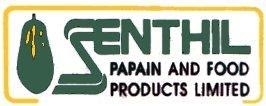 |
3 years (09.03.2016 |
|
| 2 | PharmaGenica Healthcare Pvt. Ltd., Bangalore. |  |
3 years (30.08.2016) |
|
| 3 | Phyto Specialities Pvt. Ltd, Chennai. |  |
3 years (14.10.2017) | Offered One credit industry course |
| 4 | Pasteur Institute, Coonoor. | – | 3 years (25.02.2018) |
|
| 5 | TRM Biotech Pvt. Ltd., Erode. | 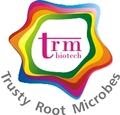 |
3 years (26.10.2018) |
|
| 6 | Molecular Connections Pvt. Ltd., Kandala Mansions, #2/2, Kariappa Road, Basavanagudi,Bengaluru-04 Tel: +91 80 40939957 Email: [email protected] | 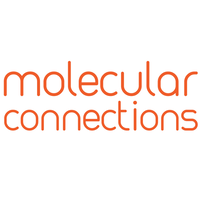 |
3 years (14.12.2018) | Students internship |
| 7 | Sakthi Dairy (A Division of ABT Foods), Coimbatore. | 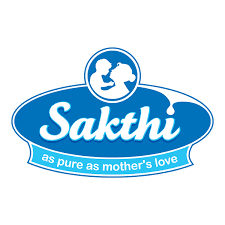 |
3 years (25.11.2019) |
|
| 8 | Golden Bio Cultures, 2/129, Thangam Ricemill compound, Ammasipalayam, Kokkarayanpet-638007, Namakkal (Dt.), Tamil Nadu. | – | 3 years (29.01.2020) |
|
“Doctors can cure diseases; Biotechnologists can create a world without diseases.”
– Moto of ABT
The Department of Biotechnology has started the Association of Biotechnologists to bring out the inherent potential of the students pursuing a career in biotechnology and beyond.
For the academic year 2021-22, the privileged office bearers are as follows:
Faculty Coordinator: Dr Kumaresan K, Associate Professor
Student office-bearers
| Student Department Association Position | Name of the Students |
|---|---|
| President | Poompavai R |
| Vice President | Shruthi S |
| Treasurer | Janani T |
| Secretary | Shabnam S |
| Joint Secretary | Mridula R |
| Technical Ambassador | Nikita Reddy S |
| Joint Treasurer | Vishwa V |
| Alumni Coordinator | Jayapoorna S, Srinidhi VG |
| Higher Studies coordinator (Abroad) | Shivani S |
| Higher Studies coordinator (India) | Architha R |
| Entrepreneurship coordinator | Lakshana B |
| Higher Studies coordinator (India) | Architha R |
| Research coordinator | Shivani S |
| Extra-curricular coordinator | Harini R |
| Journal club coordinator (PG) | Indu S |
| Documentation coordinator | Madhumita AR |
| Placement coordinator | Lawanya S |
| Media & Marketing coordinator | Kiruthika G |
| Sports coordinator | Sri Vathsan R |
LONG TERM GOAL
The Association of Biotechnologists is planning to bring in the hidden potentials of the student through the segregation of students into three categories -BIG, CCC AND EC.
THE BIOTECH INNOVATORS GLACIER (BIG) is one consisting of students with a creative mind and the curiosity to accelerate towards creating a better society and to improve human welfare with new innovations.
THE CORE CULTIVATION CULTURE (CCC) serves as a platform for those students who wish to excel in their field of interest. With CCC at their aid they would receive hands-on training that would enhance their skill in the subject.
THE ENTREPRENEUR’S CREW (EC) This portal welcomes all the CAT and IIM aspirants. These students would be exposed to the basic managerial and business tactics and also help them in initiating their own startups.
The segregation of students into their passion would definitely help them in excelling in their career and mould their soft skills. The association would regularly conduct events and seminars to hone up the students’ skills.
Highlights of the events during Academic year 2020-2021:
Bio-coterie: Bio coterie is a gathering of students interested to know more and learn more, where they will have a live virtual interaction with experienced professionals, who are strong in a specific domain. With the help of such sessions, students could gain valuable information which might help them in their careers going ahead.
ScINSPIRE ‘21: Science is like magic but real. To commemorate the National Science Day, the Association of Biotechnology (ABT) conducted ScINSPIRE, a five-day long science festival. Over the five days, 3 events and a guest talk were conducted. Along with those events, lot of awareness videos and writeups were shared through the Instagram handle of ABT.
Bio-Chronicles: “Any sufficiently advanced technology is equivalent to magic”. The Yearly magazine- BIOCHRONICLES was launched with the sole motto to keep people up-to-date about new technologies. In this year’s edition, interesting information about Nobel Laureates of 2020 and exciting new technologies in the field of Forensics Sciencewere discussed elaborately.
Forensics 2.0: The main motive of this event FORENSIC 2.0 is to provide a perspective in the field of forensic science to the participants, through quizzes, videos and case studies. To start with, FORENSIC 2.0 is a technical event that aims at imparting a basic level of knowledge in the field of forensic science. This year we had nearly 200 registrations and the event was a grand success.
Skill Enhancement Program (SEP): The whole project of SEP was aimed to launch with a motto to enhance the skills of students in a certain domain of interest through hands-on training and interaction with professionals. Every student will have their own interest and SEP would address each of them and help them to increase their skill in that specific domain.
Instrument Handling and Technical Skill Development: The aim of this whole program is to make students acclimatized to modern equipment with the help of experts. Experts from industries with specialty in certain equipment will be invited to the campus to explain the whole mechanism behind running the equipment. The experts would also elaborate the method to interpret the output collected from the device.
List of Professional Societies/ Some of the Chapters in Collaboration with the Department
| S. No | Name of the professional bodies | Web link |
|---|---|---|
| 1Association of Biotechnology Led Enterprises – ABLEhttps://www.ableindia.in/ | ||
| 2 | Biotech Consortium India Limited (BCIL) | https://www.biotech.co.in/en |
| 3 | Indian society for Technical Education (ISTE),New Delhi | http://www.isteonline.in/ |
| 4 | The Institution of engineers(IEI) (India),Kolkata | https://www.ieindia.org/webui/iei-home.aspx |
| 5 | The Biotech Research Society | https://www.brsi.in/ |
| 6 | Society Of Biological Chemists (INDIA) SBC(I) | http://sbcihq.in |
| 7 | Nutrition Society of India (NSI) | http://www.nutritionsocietyindia.com |
| 8 | Association of Microbiologists | https://amiindia.info/ |
| 9 | Indian National Science Academy (INSA) | https://www.insaindia.res.in/ |
| 10 | Indian Academy of Sciences | https://www.ias.ac.in/ |
| 11 | The National Academy of Sciences, INDIA | http://www.nasi.nic.in/ |
| 12 | Society for biotechnologists (India) | https://sbtigene.org/ |
| 13 | Asian Federation of Biotechnology (AFOB) | https://www.afob.org/ |
| 14 | Society for Industrial Microbiology and Biotechnology | https://www.simbhq.org/ |
| 15 | International Council of Biotechnology Associations (ICBA) | https://internationalbiotech.org/ |
| 16 | Biotechnology Innovation Organization (BIO) | https://www.bio.org/ |
| S No | Name of the Event | Title | Co ordinators | Year |
| 2019-2020 | ||||
| 1 | One credit Course | Biobusiness Management | Dr.K.Ram | 27t 28th July, 2019 |
| 2 | Awareness Programme | Awareness Programme on Assembling of foldscope | Dr.K.Kumaravel | 27 th July, 2019 |
| 3 | Guest Lecture | Guest Lecture on Opportunities to become a entrpreneur | Dr.R.Baskar | 7th August,2019 |
| 4 | Guest Lecture | Guest Lecture on Nanotechnology and its applications | Dr.A.Thirumurugan | 21st August,2019 |
| 2018-2019 | ||||
| 1. | Guest Lecture | Intellectual Property Rights (IPR) in Biotechnology | Dr.P.Ramalingam | 7th august, 2019 |
| 2. | Faculty Development Program | Faculty Development Program on Industrial Effluent Treatment Technologies | Dr.P.Ramalingam | 4th – 9th February, 2019 |
| 3. | Guest Lecture | Guest Lecture on Challenges and Opportunities in Food Safety | Dr.R.Baskar | 31st July, 2018 |
| 4. | Conference | ISTEM 2019 | Dr.N.Sivarajasekar | 15th February, 2019 |
| 5. | Conference | National Conference on Innovations in Bio Chemical and Food Technology- 2019 | Dr.N.Sivarajasekar | 2nd February, 2019 |
| 6. | Guest Lecture | Opportunities and Skill set requirements in Biopharma industry | Ms.Veerabhvaneshwari | 6th August, 2019 |
| 7. | Workshop | Workshop on Biopure | Dr.M.Shanmugaprakash | 2nd -3rdFebruary, 2019 |
| 8. | Workshop | Workshop on foldscope and fluorescence Imaging | Dr.K.Kumaravel | 8th February, 2019 |
| 9. | Workshop | Workshop on RTPCR | Dr.K.Kumaravel | 5th February, 2019 |
| 2017-2018 | ||||
| 1. | STTC | STTC programme on extraction process design, isolation and applications of polyphenols and value added biomaterials | Dr.T.Sathish Kumar | 23rd November – 6th December, 2017 |
| 2. | FDP | Faculty Development Programme on
Medical and Healthcare Textiles |
Dr.N.Saraswathy | 4th-17th December 2017 |
| 3. | STTC | STTC programme on “Basic Techniques in Mammalian Cell and Plant Tissue Culture” on 09.07.2017 |
Dr.R.Baskar | 9th July 2017 |
| 4. | Conference | International Conference on Waste Water Management, ICWW,2017 | Dr.R.Baskar/Dr.P.Ramalingam | 17- 19th August, 2017 |
| 5. | Guest Lecture | Guest Lecture on opportunities for biotechnologists in Healthcare | Dr.R.Baskar | 14th October,2017 |
| 2016-2017 | ||||
| 1. | Guest Lecture | Guest Lecture on nutraceutical formulation in the current market | Dr.R.Baskar | 30th August,2016 |
| 2. | Guest Lecture | Inspirational Speech by Padma sri
Arunachalam Muruganantham |
Dr.T.Sathish Kumar | 19th August, 2016 |
| 3. | Workshop | Workshop on Bioprocess Design and Simulation | Dr.Ram | 7th February 2017 |
| 4. | Workshop | Workshop on FTIR spectrum interpretation | Ms.Veerabhvaneshwari | 24th August 2016 |
| 5. | Guest Lecture | Scope of genotyping and next-generation
sequencing data in medical and population genetics and Inauguration of Departmental Blog -Biofocus |
Ms.Veerabhvaneshwari | 23th September 2016 |
| 6. | Guest Lecture | An overview of pharmacovigilance and its relevance of life science professionals | Ms.Veerabhvaneshwari | 29th August 2016 |
| S No | Title of the project | Name of the faculty | Faculty Agency | Amount (Rs. In Lakhs) |
| 2020-21 | ||||
| 1. | Design and development of fruit deterioration detector using IoT | Dr.S.Nithya Priya | TNSCST, Chennai. | 2.60 (For 18 Months) |
| 2019-20 | ||||
| 1. | Synthesis of inexpensive and novel adsorbents from coconut coir fibers for the removal of synthetic dyes from textile dyeing effluents | Dr.P.Ramalingam (PI)Dr.G.Ramakrishnan (Co-PI)
Dr.R.Manivel (Co-PI) |
AICTE, Govt. of India | 13.19 (For 3 years) |
| 2. | Development of high precision and high throughput screening platforms to identify novel anticancer and antimicrobial compounds from plant sources | Dr.K.Kumaravel (PI) | DST – SERB, New Delhi. | 33.00 (For 3 years) |
| 2018-2019 | ||||
| 1. | Development of non-absorbable soy protein nanofibre suture loaded with Rubia cordifolia and Eichhornia crassipes for surgical site infection | Dr. Bhaarati Dhurai (PI) Dr.N.Saraswathy (Co-PI) and Dr.Sheeja Rajiv (Co-PI) | SPARC, MHRD | 47.98 |
| 2. | FIST Program-2018 [TPN – 18144] | Dr.N.Saraswathy | DST | 60 |
| 2017-2018 | ||||
| 1. | The development of foldscope based device to measure leaf hairiness.A plant breeder’s tool and rapid estimation of microbes using foldscopefor pest control. | Dr.N.Saraswathy | DBT | 8 |
| 2. | Screening and isolation of natural colorant from marine algae for food applications | Mr. P. Muthukumaran | TNSCST, Chennai | 0.085 |
| 3. | Popularization of Science | Dr. N. Saraswathy Mrs. S. Nithya Priya |
TNSCST | 0.1 |
| 4. | Detection of Bacteriophage Contamination in starter cultures in dairy industry |
Dr. N. Saraswathy | KCT | 2.07 |
| 5. | Anaerobic and Methane Production Process from Organic Wastes using Novel Membrane Reactors |
Dr. M. Shanmuga Prakash | KCT | 2.1 |
| 6. | Three phase aqueous extraction of bromoline from pineapple waste | Dr. M. Shanmuga Prakashrcal | Re, KCT | 0.35 |
| 7. | Acylated cellulose fibres for dye removal | Dr. P . Ramalingam | Re, KCT | 0.23 |
| 8. | A remedy for dye pollution : Natural pigment extraction from black carrot | Dr. N. Sivarajasekaran | Re, KCT | 0.09 |
| 9. | Synthesis of higher acylatedcellulose cotton fibers for the
selective removal of dyes in real textile dyeing effluents |
Dr. P. Ramalingam | KCT | 2.25 |
| 2016-2017 | ||||
| 1. | Characterization and Immobilization of banana peel protease to incorporate in wound dressing material for genital warts | Dr.R.Baskar | DBT | 32.87 |
| 2. | Extraction of residual synthetic dyes from textile dyebath effluent using soluents in multistage centrifugal extract | Dr. P. Ramalingam | DST | 27.85 |
| 2015-2016 | ||||
| 1. | Preparation and Evaluation of in-situ forming alginate hydrogel curcumin as bioactive wound dressing material (RGYI) | Dr.N.Saraswathy | DBT | 10.4 |
| Grant Total (In Lakhs) | 86.395 | |||
Projects that were funded from KCT’S PLATFORM FOR RESEARCH & EXPLORATION (Re`)for the students of Department of Biotechnology for the period of 2016 -2018:
| TITLE OF THE PROJECT | PROJECT ID | SANCTIONED AMOUNT(Rs.) | MENTOR |
|---|---|---|---|
| 2016-2017 | |||
| Polymer based alternative method to extract bromelain from pineapple | 0716-026 | 24,000 | Dr. M. Shanmugaprakash |
| Removal of synthetic dyes from textile dying effluents using propyl and butyl coconut coir fibers | 0716-056 | 23,000 | Dr. M. Shanmugaprakash |
| A remedy for dye pollution | 1116-001 | 20,000 | Mrs. R SukanyaDevi (TXT) and Dr. N. Sivarajasekar |
| 2017-2018 | |||
| Development of biomaterial based peelable film for acne treatment | 0717-018 | 15,495 | Ms. V. Veerabhuvaneswari |
| Development and evaluation of epidermal hydrogel patch loaded with Cocinia indica aqueous extract for treating psoriasis | 0717-010 | 58,930 | Dr. N. Saraswathy |
| Development of mobile fluorescence microscope for biomedical diagnostics | 0717-012 | 13,200 | Dr. K. Kumaravel |
| Ideal usage of food and vegetables waste from kct hostel mess | 0717-013 | 1,00,000 | Dr. D. R. Manimaran |
| Anti-diabetic potential of combination of fermented soy milk and flax seed milk in a rat model | 0717-015 | 40,000 | Ms. V. Veerabhuvaneswari |
| Synthesis of novel adsorbents from bacterial enzymes for removal of dyes in textile dying effluents | 0717-022 | 37,480 | Dr. P. Ramalingam |
| A novel herbal tea formulation for liver and kidney protection and rejuvenation: Nutritional, physicochemical and sensory analysis |
1117-009 | 38,800 | Dr. R. Baskar |
| 2018 – 2019 | |||
| Modulation in the expression of GLUT-4 receptor in the adipocytes of Type II diabetes by tannoid principles of Emblica officinalis | 1118-015 | 50,000 | Dr. R. Baskar |
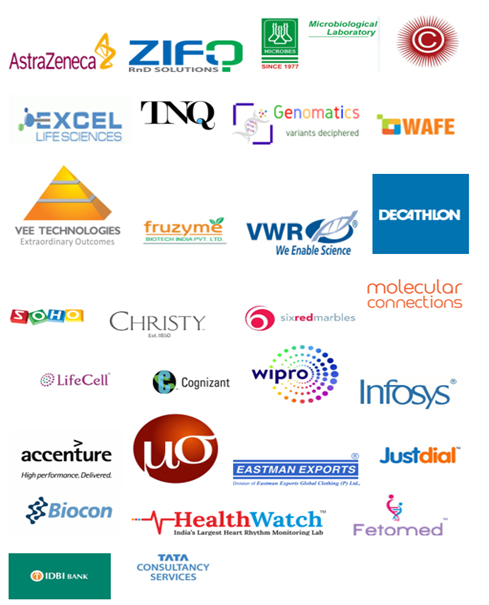
B.TECH BIOTECHNOLOGY PROGRAM
| Batch | Number of Companies visited | No of Student placed | Total Strength |
|---|---|---|---|
| 2020-21 | 5 | 8 | 56 |
| 2019-20 | 10 | 18 | 55 |
| 2018-19 | 14 | 31 | 59 |
| Batch | No of students placed in IT company | No of students placed in Core Company | No of students opted for placement | Total strength |
| 2010-2014 | 36 | 7 | 41 | 58 |
| 2011-2015 | 35 | 5 | 40 | 55 |
| 2012-2016 | 22 | 10 | 38 | 57 |
| 2013-2017 | 17 | 5 | 30 | 58 |
| 2014-2018 | 9 | 23 | 30 | 63 |
| 2015-2019 | 7 | 16 | 35 | 59 |
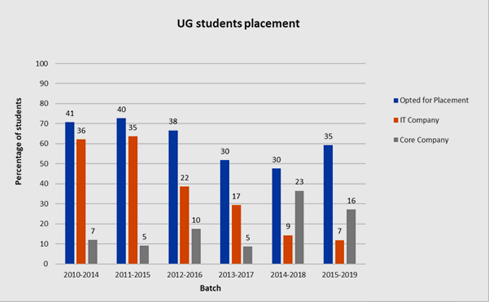
M.TECH BIOTECHNOLOGY PROGRAM
Students were placed in academic institution as Assistant Professors with salary package of 3- 4 lakh per annum and were hired by core industries like Neuberg Erlich lab (Chennai); Evolva Biotech (Chennai) with salary package of 2.5 lakh per annum. Students join as junior research fellows and senior research fellows in reputed research institutions.
PROGRAM ASSESSMENT YEAR: 2021-2022
|
Academic Year |
No. of students offered Placements |
|
2021-2022 |
10 |
|
2020-2021 |
11 |
|
2019-2020 |
5 |
PROGRAM ASSESSMENT YEAR: 2016-2018
| S No | Name of the student placed | Register number | Designation/ Program | Name of the Employer / Research Institution |
| PLACEMENT | ||||
| 1 | KABILAN.S.J | 16MBT001 | ASSISTANT PROFESSOR | KALASALINGAM UNIVERSITY, VIRUDHUNAGAR |
| 2 | SUBASHINI.R | 16MBT004 | ASSISTANT PROFESSOR | VINAYAKA MISSION, SALEM |
| 3 | VIJAYALAKSHMI.V | 16MBT014 | PRODUCT SPECIALIST, MICROBIOLOGY | NEUBERG ERLICH LAB, CHENNAI |
| 4 | APARNA.S | 16MBT010 | SENIOR RESEARCH FELLOW | GOVT BOTANICAL GARDEN , OOTY- HORTICULTURE DEVELOPMENT AGENCY |
| 5 | PRIYADHARSHINI.S | 16MBT015 | SENIOR RESEARCH FELLOW | GOVT BOTANICAL GARDEN , OOTY- HORTICULTURE DEVELOPMENT AGENCY |
| HIGHER STUDIES | ||||
| 1 | KRITHIKA.S | 16MBT018 | 53069- AICTE NDF FELLOWSHIP | PSG COLLEGE OF TECHNOLOGY, COIMBATORE |
MTECH BIOTECHNOLOGY, PROGRAM ASSESSMENT YEAR: 2015-2017
| S No | Name of the student placed | Registration number | Designation/ Program | Name of the Employer / Research Institution |
| PLACEMENT | ||||
| 1 | PARAMASIVAN T | 15MBT005 | JUNIOR RESEARCH FELLOW | ANNA UNIVERSITY, TRICHY |
| 2 | RAMAPRIYA R | 15MBT006 | ASSISTANT PROFESSOR-I | VINAYAKA MISSION UNIVERSITY, SALEM |
| HIGHER STUDIES | ||||
| 1 | BALAJI S | 15MBT007 | CSIR SENIOR RESEARCH FELLOW, PHD, KCT | ANNA UNIVERSITY, CHENNAI |
| 2 | MIRRA. R.R | 15MBT004 | PHD, KCT | ANNA UNIVERSITY, CHENNAI |
M.TECH BIOTECHNOLOGY, PROGRAM ASSESSMENT YEAR: 2014-2016
| S No | Name of the student placed | Registration number | Designation/ Program | Name of the Employer / Research Institution |
| PLACEMENT | ||||
| 1 | AKILA S | 14MBT002 | RESEARCH SCIENTIST | EVOLVA BIOTECH |
| 2 | ASWINI V | 14MBT003 | VIT DBT-SBST/JRF |
SCHOOL OF BIO SCIENCES AND TECHNOLOGY, VIT, VELLORE |
| 3 | NIROSHA M | 14MBT010 | ASSISTANT PROFESSOR-I | SELVAM COLLEGE OF ENGINEERING, NAMAKKAL |
| HIGHER STUDIES | ||||
| 1 | BALAJII M | 14MBT004 | SERB-JRF | PSG COLLEGE OF TECHNOLOGY, COIMBATORE |
| 2 | GOURI S | 14MBT005 | MS-NEUROSCIENCE | AUSTRALIAN NATIONAL UNIVERSITY |
PROGRAM ASSESSMENT YEAR: 2013-2015
| S No | Name of the student placed | Registration number | Designation/ Program | Name of the Employer / Research Institution |
| PLACEMENT | ||||
| 1 | GOPINATH D | 13MBT03 | TRAINEE-R&D | INDFRAG LIMITED |
| 2 | JAYASHREE R | 13MBT04 | TRAINEE | INFOSYS |
| 3 | KARTHIKEYAN.M | 13MBT05 | ASSISTANT PROFESSOR, | PERIYAR MANIAMMAI UNIVERSITY |
| 4 | KAVITHA S | 13MBT06 | ASSISTANT PROFESSOR | ADHIYAMAAN EDUCATIONAL AND RESEARCH INSTITUTTIONS |
| 5 | MARIYA THOMAS | 13MBT08 | EXECUTIVE | SAKSIN LIFESCIENCES PRIVATE LIMITED |
| 6 | MOHANA PRIYA.R | 13MBT09 | ASSISTANT GRADE III-TECHNICAL | FOOD CORPORATION OF INDIA |
| 7 | SENTHILKUMAR S N S | 13MBT15 | i. TRAINEE- R&D ii. SCIENTIST IN PAS ANALYTICAL & CHARACTERIZATION |
I. BHARAT BIOTECHII. BIOCON |
| 8 | SUGANTHY.M | 13MBT18 | i. JUNIOR ASSOCIATE LIFE SCIENCESii. SENIOR RESEARCH FELLOW | i. VWR LABORATORYii. DBT, FOLDSCOPE PROJECT |
| HIGHER STUDIES | ||||
| 1 | SHARATH S | 13MBT16 | PH.D | IIT MADRAS |
CAREER SKILL DEVELOPMENT: INTERACTION WITH INDUSTRY
MoU was signed with Molecular Connections Pvt Ltd, on 14.12.2018 and a dedicated facility- Life Science Informatics Facility was inaugated on by Executive officer, KCT and Mr. Venugopal B Director-Talent Management Molecular Connections Pvt. Ltd.
Molecular Connections Pvt Ltd., Bangalore has hired our B. Tech Biotechnology students and offered full time internship training from December 2018 to April 2019. The internship training was conducted by Ms. P. Nithya Priya and Mr. G. Sachin, subject matter expert from Molecular Connections. Future career guidance workshops and domain specific skill-set training are planned to be done at the facility.
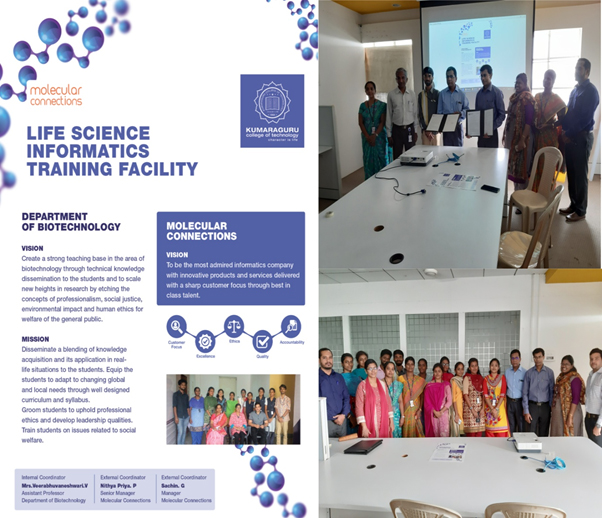
CAREER DAY
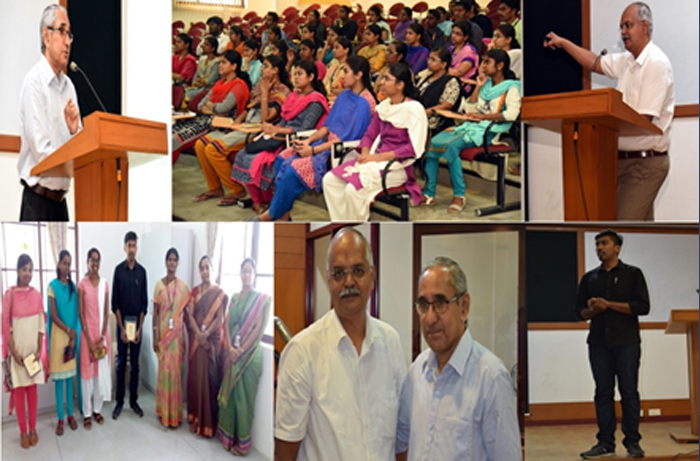
Career Day 2017
Dr. K.N. Brahmadathan, Director, Microbiological Laboratory Research and Services India Pvt. Ltd gave a guest lecture on “Opportunities in Diagnostics “ and Dr. D. Ramesh Kumar, CEO, Salem Microbes Private Limited, gave guest lecture on “Opportunities in Aquaculture and Bioremediations using Natural Microbes “ during Career Day 2017. During Career Day core skill set required and opportunities were discussed by subject matter experts from industry. Different speakers from the industry focused on the topic of Opportunities in Diagnostics, Opportunities in Aquaculture and Bioremediations using Natural Microbes, Social Entrepreneurship, Literature curation and Medical coding. The students also had a presentations prepared by the industrial experts designed in a way to understand the work atmosphere of an industry.
The session was very interactive and students gained more information in different aspects in different industry. The experts explained about the techniques and procedures that they use in industries.
Career Day 2018 mainly focused on industrial process and techniques carried out in Biocon. Three different speakers from the Biocon industry namely Mr. Thirumurugan Nagulasamy, Associate manager, Biosimilars, Biocon Pvt, Ltd., Mr. Unni Krishnan, Senior Director, Quality, Biocon Pvt, Ltd., Mr. Dinesh Baskar – Manager, Biocon Pvt, Ltd focused on the topic of Quality control in Pharma, Biologies Process Development and A case study on Monoclonal antibody production – Production perspective. The students also had a small case study report prepared by the industrial experts designed in a way to understand the work atmosphere of an industry.
The session was very interactive and students gained more information in the aspects of production, Upstream, Downstream processing and also on Quality control. The experts also explained about the techniques and procedures that they use in industries for the production process.
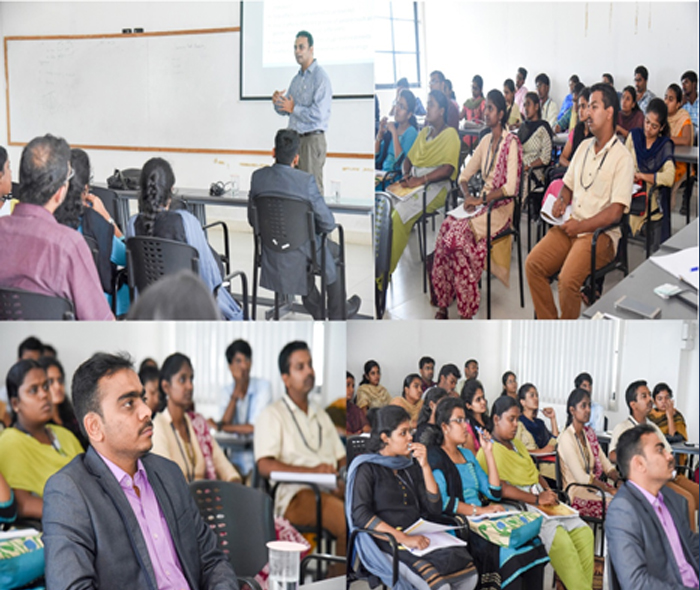
Career Day 2018
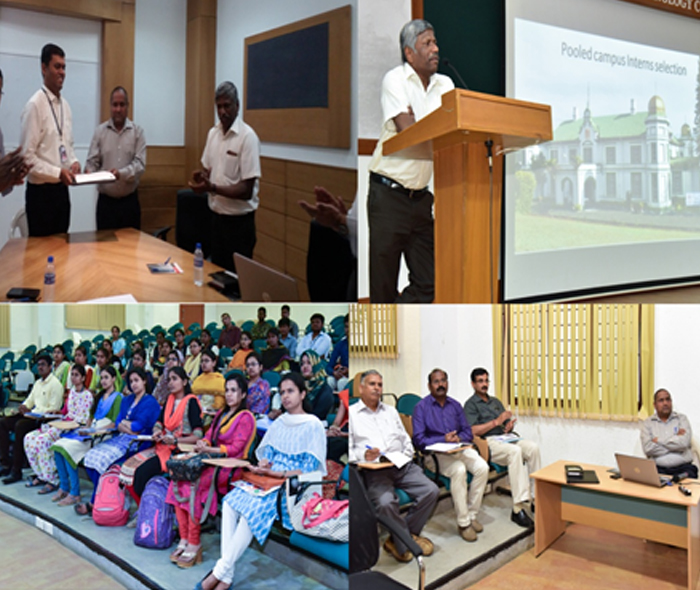
Interaction with Pasteur Institute of India, Coonoor
Focus has been given to students for industry exposure through industry visits and internships at Industry. MOU has been signed with Pasteur Institute of India, Nilgiris, Coonoor and has recruited our PG students as interns with a stipend in various departments like Vaccine production, Quality Control and Quality Assurance.
